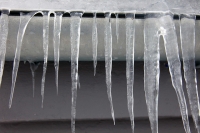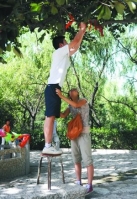每當我們的桑樹開花
它們的氣味總是飄飛起來
飄進我的窗口……
尤其在夜晚和雨後。
那些樹就在拐彎的街角
離這兒衹有幾分鐘的路。
夏天當我跑到
它們懸起的樹梢下
吵鬧的黑鳥已經摘去了
幽暗的果實。
當我站在那些樹下並吮吸
它們豐富的氣味
四周的生命仿佛突然塌下
一種奇異而奢侈的感覺
如同被女人的手所觸摸
當那些輕輕的吻
在你額頭幹涸之前
你彎着腰去喝
水晶清明的水
從來沒人懷疑
你是否將接觸那些嘴唇
某些時刻
不耐煩的血
從內部模鑄你的軀體
比雕塑傢的塑泥上
跑動着的手指更迅速
也許你會將她
年輕的頭髮放在手掌裏
讓它們掠過雙肩
就像打開的鳥翅
你將沉重地追逐它們
那兒,
在你眼前
並且在空氣之下的深處
是那傾斜的,恐怖的
和甜蜜的空虛
滲透着點點滴滴的光。
在臨終前的最後幾秒
母親的臉轉嚮我們
哽咽而沙啞地說
“什麽都沒有。”
然後她的嘴唇默默地永恆地閉上。
她那被親吻過一百次的玫瑰花圈
落到怎樣的深淵?
她所有的祈禱
和年輕時唱過的悄悄的歌
飄到哪兒去了呢?
那些小小的事情引起的恐懼和憂鬱
又到哪兒去了呢?
一切罪孽都有清晰的定義
對的或錯的
並且那些對的和別的一樣好!
在短短的一剎那
當我們蹦跳着離開土地的腳
又掉落下來
她經歷了怎樣的黑暗?
我靜靜地來到陽臺
並從母親的破損的椅子
往上看
嚮那高處的某種陰鬱。
在我們漫長的一生中
它們一直從窗口瞪視我們
不提任何要求,
也不嚮我們索取任何東西。
隨你怎麽想
它們有一種無法形容的美。
那麽我們嘗試着泯滅它們
用常青藤的種子,
玫瑰花的種子,
詞和眼淚!
並且最後我們想要撕開
它們的發光的鎖
用我們最後一次呼吸
那是,(甚至在我們強有力的喉嚨裏)
最弱的。
她像細瓷花瓶中的鮮花一樣美麗,
我的祖國、我的故鄉;
她像細瓷花瓶中的鮮花一樣美麗,
又像你剛剛切開的、
香甜可口的面包瓤。
儘管你一百次地感到失望和沮喪,
你還是回到了祖國的懷抱;
儘管你一百次地感到失望和沮喪,
你還是回到了富饒、美麗的故鄉,
回到像采石場上的春天一樣貧窮的故鄉。
她像細瓷花瓶中的鮮花一樣美麗,
她也像自身的過失那麽深沉,
她便是我們無法忘記的祖國!
當生命的最後一刻來臨,
我們將長眠在她那苦澀的泥土之中。
寧靜的流水
仍然在秋日的小河中歌唱,
歌聲仍然像古裏斯琴一樣清越。
可是這歌聲能否久長?
戰爭呀,我們仍然在追求愛情和春光,
仍然漫步在潔淨的田野上,
把你破碎了的可怖的戰袍踩在腳下。
可是我們的追求能否久長?
路邊,一輛輛坦剋仍然在用它們
沒有了腦髓的鋼鐵的顱骨嚇唬着行人,
它,比黑夜還要黑的戰爭,
仍然在用它的發源地威脅着世人。
母親喜悅地鋪開襁褓,
堅信必有光明的來朝。
去吻她的手吧,但首先
吻哪一隻手,哪一隻?
先吻那衹輕輕地擠着乳頭的手,
還是那衹抱着嬰兒的手?
愛情和忠貞不是在這裏
又能到哪裏去尋求?
嗬,這可真是催人淚下——
母親的需求是那樣的少,
衹要在荊棘叢中種上少許莊稼,
她們就心滿意足!
她們衹求有一點兒寧靜、溫暖和五月的春光,
要知道搖籃的吱嘎聲和樸素的催眠麯,
還有那蜜蜂和蜂房
遠遠勝過刺刀和槍彈。
不管你怎樣威嚇我們,
妻子、小鳥和兒童决不會任你蹂躪!
啊,戰爭,但願你華美的盔甲,
永遠布滿鐵銹的斑痕!
Sometimes
when she would talk about herself
my mother would say:
My life was sad and quiet,
I always walked on tip-toe.
But if I got a little angry
and stamped my foot
the cups, which had been my mother's,
would tinkle on the dresser
and make me laugh.
At the moment of my birth, so I am told,
a butterfly flew in by the window
and settled on my mother's bed,
but that same moment a dog howled in the yard.
My mother thought
it a bad omen.
My life of course has not been quite
as peaceful as hers.
But even when I gaze upon our present days
with wistfulness
as if at empty picture frames
and all I see is a dusty wall,
still it has been so beautiful.
There are many moments
I cannot forget,
moments like radiant flowers
in all possible colours and hues,
evenings filled with fragrance
like purple grapes
hidden in the leaves of darkness.
With passion I read poetry
and loved music
and blundered, ever surprised,
from beauty to beauty.
But when I first saw
the picture of a woman nude
I began to believe in miracles.
My life unrolled swiftly.
It was too short
for my vast longings,
which had no bounds.
Before I knew it
my life's end was drawing near.
Death soon will kick open my door
and enter.
With startled terror I'll catch my breath
and forget to breathe again.
May I not be denied the time
once more to kiss the hands
of the one who patiently and in step with me
walked on and on and on
and who loved most of all.
If you're at your wits' end concerning love
try falling in love again —
say, with the Queen of England.
Why not!
Her features are on every postage stamp
of that ancient kingdom.
But if you were to ask her
for a date in Hyde Park
you can bet that
you'd wait in vain.
If you've any sense at all
you'll wisely tell yourself:
Why of course, I know:
it's raining in Hyde Park today.
When he was in England
my son bought me in London's Piccadilly
an elegant umbrella.
Whenever necessary
I now have above my head
my own small sky
which may be black
but in its tensioned wire spokes
God's mercy may be flowing like
an electric current.
I open my umbrella even when it's not raining,
as a canopy
over the volume of Shakespeare's sonnets
I carry with me in my pocket.
But there are moments when I am frightened
even by the sparkling bouquet of the universe.
Outstripping its beauty
it threatens us with its infinity
and that is all too similar
to the sleep of death.
It also threatens us with the void and frostiness
of its thousands of stars
which at night delude us
with their gleam.
The one we have named Venus
is downright terrifying.
Its rocks are still on the boil
and like gigantic waves
mountains are rising up
and burning sulphur falls.
We always ask where hell is.
It is there!
But what use is a fragile umbrella
against the universe?
Besides, I don't even carry it.
I have enough of a job
to walk along
clinging close to the ground
as a nocturnal moth in daytime
to the coarse bark of a tree.
All my life I have sought the paradise
that used to be here,
whose traces I have found
only on women's lips
and in the curves of their skin
when it is warm with love.
All my life I have longed
for freedom.
At last I've discovered the door
that leads to it.
It is death.
Now that I'm old
some charming woman's face
will sometimes waft between my lashes
and her smile will stir my blood.
Shyly I turn my head
and remember the Queen of England,
whose features are on every postage stamp
of that ancient kingdom.
God save the Queen!
Oh yes, I know quite well:
it's raining in Hyde Park today.
All night rain lashed the windows.
I couldn't go to sleep.
So I switched on the light
and wrote a letter.
If love could fly,
as of course it can't,
and didn't so often stay close to the ground,
it would be delightful to be enveloped
in its breeze.
But like infuriated bees
jealous kisses swarm down upon
the sweetness of the female body
and an impatient hand grasps
whatever it can reach,
and desire does not flag.
Even death might be without terror
at the moment of exultation.
But who has ever calculated
how much love goes
into one pair of open arms!
Letters to women
I always sent by pigeon post.
My conscience is clear.
I never entrusted them to sparrowhawks
or goshawks.
Under my pen the verses dance no longer
and like a tear in the corner of an eye
the word hangs back.
And all my life, at its end,
is now only a fast journey on a train:
I'm standing by the window of the carriage
and day after day
speeds back into yesterday
to join the black mists of sorrow.
At times I helplessly catch hold
of the emergency brake.
Perhaps I shall once more catch sight
of a woman's smile,
trapped like a torn-off flower
on the lashes of her eyes.
Perhaps I may still be allowed
to send those eyes at least one kiss
before they're lost to me in the dark.
Perhaps once more I shall even see
a slender ankle
chiselled like a gem
out of warm tenderness,
so that I might once more
half choke with longing.
How much is there that man must leave behind
as the train inexorably approaches
Lethe Station
with its plantations of shimmering asphodels
amidst whose perfume everything is forgotten.
Including human love.
That is the final stop:
the train goes no further.
Life taught me long ago
that music and poetry
are the most beautiful things on earth
that life can give us.
Except for love, of course.
In an old textbook
published by the Imperial Printing House
in the year of Vrchlický's death
I looked up the section on poetics
and poetic ornament.
Then I placed a rose in a tumbler,
lit a candle
and started to write my first verses.
Flare up, flame of words,
and soar,
even if my fingers get burned!
A startling metaphor is worth more
than a ring on one's finger.
But not even Puchmajer's Rhyming Dictionary
was any use to me.
In vain I snatched for ideas
and fiercely closed my eyes
in order to hear that first magic line.
But in the dark, instead of words,
I saw a woman's smile and
wind-blown hair.
That has been my destiny.
And I've been staggering towards it breathlessly
all my life.
依依惜別他的親人。
每天都有事物在終結,
極其美好的事物在終結。
信鴿在高空拍打雙翼,
飛呀飛呀重返故裏。
我們帶着希望也帶着絶望,
從此永遠回到家乡。
請你擦幹濕潤的眼睛,
朗朗一笑別再傷心。
每天都有事物在開始,
極其美好的事物在開始。
水井總在甜美地歌唱。
水井啊,請把這支歌兒教給我!
叮——咚!聽見嗎,我這歌兒?
一群小鵝踉踉蹌蹌
迅跑在春天的草地上,
你若從高處俯視它們,
仿佛一片盛開的蒲公英。
春天匆匆來到灌木叢梢,
老母雞翼下撲出一群雛雞,
餓得唧唧唧唧直叫。
上帝啊,但願它們中最小的一隻也能在你光照韻大地上覓到𠔌粒。
衹有人才能在艱難歲月中
靠夢想與希望充饑。
【注釋】 ①在捷剋斯洛伐剋的農村,每到春天.孩子們愛砍下一節柳樹枝,抽掉中間的硬幹,留下樹皮做成哨子吹着玩。
《裙兜裏的蘋果》
爬滿了長長的青藤,
小花杯裏盛着一滴甘露,
獻給你潤潤嘴唇。
路人的腳步頓時變得輕快,
仿佛嘗到一杯名貴的美酒瓊液,
過路的孩子說什麽?他感到了:
是媽媽在呼吸,散發出沁人的香氣。
你好好記住:
人世間有比愛情
更大的樂趣。
也許——是。
殺戮也是一種樂趣。
肯定有人
並非不感到愜意地
從被殺害者的身上邁過去。
也許——是。
戰爭結束,
誰還願意在這個時刻
去思考
那些悲傷的事情?!
也許——我願意:
若是讓女人來
操作大炮,
落到人世間的
衹能是玫瑰.
也許——是,
也許一—不是。




